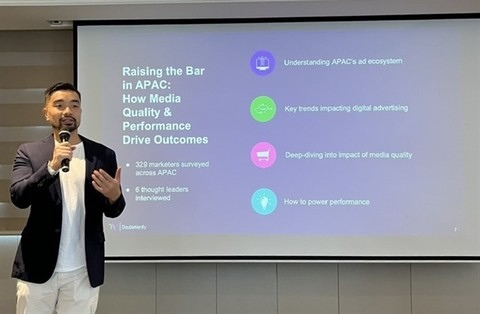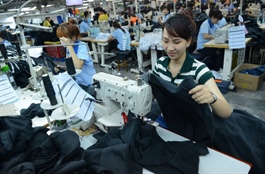Consumers rely on social media for product research before making purchase decisions: Report
Consumers rely on social media for product research before making purchase decisions: Report
There is a huge appetite for social media across the Asia Pacific region, with 60 per cent of the world’s social media users coming from the region, including Việt Nam, according to a report released by DoubleVerify, a software platform for digital media measurement, data and analytics.

Jeremy Chang, DoubleVerify’s senior director for SEA and North Asia, shares insights into the advertising industry and media quality landscape in the Asia Pacific, where Việt Nam is a key market, at a meeting held in HCM City on February 27. — Photo Thu Hằng |
The “Raising the Bar in APAC: How Media Quality and Performance Drive Outcomes” report, collaboratively produced with industry intelligence WARC last year, surveyed 329 marketers across the region.
DoubleVerify on Tuesday disclosed a number of findings with great relevance and utility for players in the advertising industry across the Asia Pacific that provide them with valuable insights to enhance their advertising performance.
The report found that marketers in the region recognise the importance of measuring media quality, with 91 per cent agreeing that it is important to do so to drive performance in digital advertising, and 98 per cent using ad verification tools in their campaigns.
But the report showed ad verification tools are not “always on” for APAC marketers, with one in three using them only on an ad-hoc basis.
A significant portion fail to evaluate digital media buys against core quality metrics, with only 17 per cent evaluating critical effectiveness indicators like brand suitability, viewability, fraud, or if the ad was served in the intended geography.
“In the dynamic landscape of digital advertising expenditure growth in the Asia Pacific, it is imperative for advertisers to protect their investments through continuous verification across all channels, to prevent loss of media investment to fraud, viewability and brand suitability violations,” Jeremy Chang, DoubleVerify’s senior director for SEA and North Asia, said.
The changing landscape of social media and the ascent of retail media, highlighted by DoubleVerify, are reshaping the strategies through which advertisers harness digital platforms.
From the initial discovery phase to the final purchase decision, consumers in the Asia Pacific region engage with social media at different stages of the purchasing journey.
In Việt Nam, a substantial 59 per cent of consumers rely heavily on social media to conduct product research before making their purchase decisions.
Super-apps are also a big phenomenon at the moment, with local commerce marketplaces such as Grab, Lazada and Websosanh having grown in popularity as discovery channels, beating out social media and Google search.
Marketers agree with the rising significance of retail media, with 99 per cent of APAC marketers planning to increase retail media spend over the next 12 months.
Some 98 per cent of marketers surveyed said they use attention metrics measurement tools to evaluate digital media purchases, but traditional metric measurements alone are not enough.
Developments in AI will have a far-reaching impact on the advertising industry, especially the predictive capabilities of machine learning, to optimise ad performance in various areas.
Corina Trang Luong, senior sales director for Việt Nam at DoubleVerify, said: “At DoubleVerify, we see Việt Nam as a flourishing market with significant potential in the digital business landscape.
“According to Statista, Việt Nam is the third fastest growing advertising market in Southeast Asia, expected to reach US$2.6 billion by 2024, which offers marketers a unique opportunity to optimise campaigns and expand their audience reach.
“We encourage Việt Nam’s marketers to prioritise media quality, with emphasis on core quality metrics as highlighted in our report.
“By ensuring always-on verification across all channels, marketers can safeguard their investments. Otherwise they risk wasting media dollars.”






















